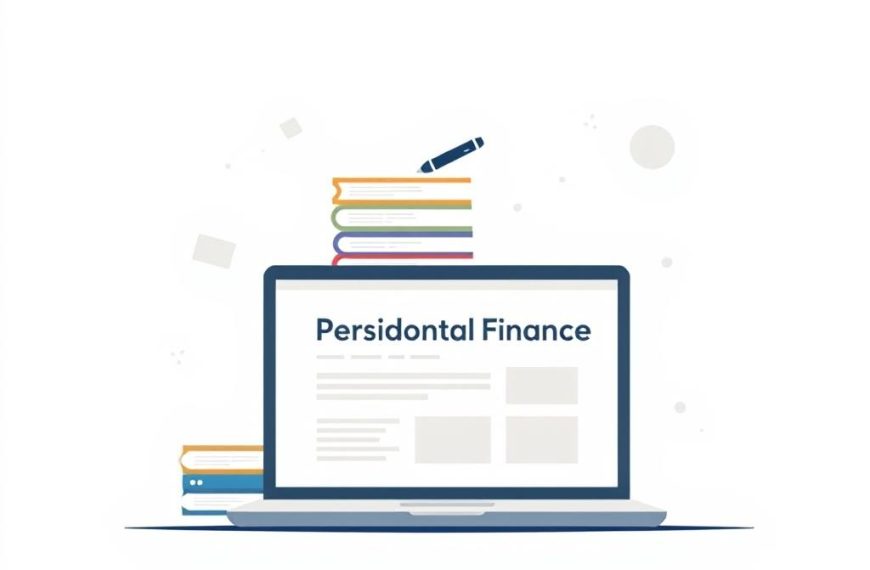Personal finance is a vital skill for taking control of your financial future. With 78% of Americans living paycheck to paycheck, money management is crucial. It’s about handling income, expenses, savings, and investments effectively.
Financial planning creates a roadmap for your fiscal health. People who budget are three times more likely to feel in control of their finances. Yet, only 40% of Americans maintain a budget, showing room for improvement.
The world of personal finance can seem daunting at first. However, breaking it down into smaller steps can change your financial outlook. Understanding savings, investment, and debt management helps build a solid foundation.
Alarmingly, 39% of adults have no emergency savings. This highlights the urgent need for financial education and planning. Learning these skills can make a significant difference in your financial security.
This guide will cover essential personal finance strategies. You’ll develop skills to make informed financial decisions. From budgeting to investing, you’ll gain practical insights for a secure financial future.
Understanding Personal Finance Fundamentals
Personal finance is a vital life skill. It helps you control your financial well-being. Managing money wisely creates a path to long-term financial stability.
Financial success relies more on behaviour than knowledge. Research shows personal finance is 20% head knowledge and 80% behaviour. Taking action trumps simply understanding financial concepts.
What is Personal Finance?
Personal finance covers various financial activities and decisions. These impact your monetary health.
- Budgeting basics and expense tracking
- Setting financial goals
- Managing income and expenses
- Saving and investing
- Managing debt and credit
The Importance of Financial Planning
Financial planning is key to achieving your monetary goals. It helps you manage money strategically.
- Prepare for unexpected expenses
- Build long-term wealth
- Reduce financial stress
- Make informed financial decisions
Benefits of Financial Literacy
Grasping financial principles can boost your financial well-being. Here’s a breakdown of key benefits:
| Benefit | Impact |
|---|---|
| Emergency Preparedness | Build a £1,000 starter fund, eventually expanding to 3-6 months of expenses |
| Debt Management | Develop strategies like the debt snowball method |
| Investment Knowledge | Learn to invest 15% of income for retirement |
Financial literacy is not about being perfect, but about making progressive improvements in your financial journey.
How to Do Personal Finance
Personal finance is a vital skill that shapes your financial future. Many find money management daunting, but breaking it down into steps helps. Understanding budgeting, building security, and setting goals are key elements.
A solid financial foundation needs strategic planning and consistent effort. Let’s explore the essential parts of effective personal finance management.
Creating a Realistic Budget
Budget creation is crucial for financial success. Only 30% of Americans have a budget, showing a gap in financial knowledge. To make an effective budget:
- Track all income sources
- List monthly expenses in detail
- Use the zero-based budgeting approach
- Allocate funds purposefully
Zero-based budgeting assigns every pound a specific purpose, boosting financial control. Aim to categorise expenses and identify areas for potential savings.
Building an Emergency Fund
Emergency savings are vital for financial stability. Surprisingly, 40% of Americans can’t cover a £400 unexpected expense. Financial experts suggest:
- Start with an initial £1,000 emergency fund
- Gradually build to 3-6 months of living expenses
- Keep funds in an easily accessible account
- Treat emergency savings as a non-negotiable expense
Setting SMART Financial Goals
SMART goals offer a structured approach to financial planning. These goals are:
- Specific: Clearly defined objectives
- Measurable: Quantifiable targets
- Achievable: Realistic expectations
- Relevant: Aligned with personal circumstances
- Time-bound: Clear deadlines
By using these strategies, you can take charge of your finances. You’ll be on your way to building a secure future.
Smart Money Management Strategies
Mastering debt management is vital for financial stability. The CFPB notes that effective budgeting helps balance needs, wants, and savings. This approach builds a strong foundation for future goals.
Smart money management requires a strategic approach. Here are key strategies to consider:
- Keep credit utilisation below 30% to maintain a healthy credit score
- Choose an effective debt repayment method:
- Snowball method: Pay off smallest balances first
- Debt avalanche method: Prioritise highest interest debts
- Set up automatic savings to build an emergency fund
Savings strategies are crucial for financial planning. Tracking spending can cut unnecessary expenses by up to 20%. Experts suggest saving 3 to 6 months of living expenses.
This buffer protects against unexpected financial challenges. It provides peace of mind and financial security.
Consistent financial tracking and disciplined saving are the cornerstones of financial success.
Here are more money management tips to consider:
- Monitor your credit report regularly using free services
- Pay bills on time to improve credit scores
- Review and cut unnecessary subscription services
- Explore retirement savings options like 401(k) and IRA accounts
Implementing these strategies creates a robust financial foundation. It supports your long-term financial goals and ensures a stable future.
Investment Essentials for Beginners
Investing can be overwhelming for newcomers. Understanding investment options and asset allocation is vital for building wealth. This guide explores key investing principles and risk management.
Exploring Investment Options
Investors have several ways to grow their wealth. Here are the main investment options:
- Stocks: Representing ownership in companies
- Bonds: Fixed-income securities with predictable returns
- Mutual Funds: Professionally managed investment portfolios
- Exchange-Traded Funds (ETFs): Traded like stocks with broad market exposure
- Real Estate: Property investments with potential appreciation
The ‘100 Minus Age’ Rule
The ‘100 minus age’ rule guides asset allocation. It suggests your equity investments should equal 100 minus your age. For example, a 30-year-old might aim to have 70% of their investments in stocks, with the remaining 30% in more conservative options.
Balancing Risk and Return
Effective risk management is crucial in investment strategies. Diversification helps reduce potential losses by spreading investments across different asset classes.
Consider these risk management principles:
- Start with low-cost index funds
- Gradually build a diversified portfolio
- Regularly rebalance your investments
- Understand your personal risk tolerance
Remember, no investment is without risk, but informed decisions can help maximise potential returns.
The average annual stock market return is about 10% before inflation. This makes long-term investing attractive for wealth growth. Most online brokers now offer no account minimums, making it easier to start investing.
Leveraging Technology for Personal Finance
Innovative digital budgeting tools have transformed how we manage our finances. These powerful solutions make complex money management more accessible. Technology now offers effective ways to plan and control personal finances.
Finance apps have become essential for personal financial strategy. They provide users with insights into their spending habits. These digital platforms help people make informed decisions about their money.
- Real-time expense tracking
- Automated budget categorisation
- Personalised financial recommendations
- Secure online banking integration
Digital financial tools have made a significant impact. 45% of individuals using AI-powered finance apps report increased confidence in managing their finances. These tools can cut financial education time by half.
They provide instant answers compared to traditional methods. This efficiency helps users save time and make better financial choices.
When choosing online banking and digital budgeting tools, look for these features:
- Advanced security protocols
- User-friendly interface
- Comprehensive financial reporting
- Multi-platform accessibility
Top finance apps like Rocket Money and Goodbudget offer smart features. These include automatic transaction sorting and personalised budget alerts. Such tools help users avoid overspending and maintain good financial habits.
Technology is transforming personal finance from a complex challenge into an manageable, strategic process.
Digital finance continues to evolve rapidly. Users can expect more advanced tools in the future. These will provide deeper financial insights and more tailored guidance.
Preparing for Major Life Events
Strategic financial planning is vital for life’s big transitions. Each milestone brings unique money challenges that need careful thought. Understanding how to adapt your financial strategy is crucial for various life stages.
Key life milestones often need specific financial prep. Here are some essential steps for managing your long-term goals:
- Create a flexible budget that can accommodate changing life circumstances
- Build an emergency fund to provide financial stability during transitions
- Reassess insurance needs at each major life stage
- Review and adjust investment strategies periodically
Financial planning is critical during significant life changes. Understanding financial preparation for major life events can help you navigate challenges effectively. About 40% of Americans struggle with unexpected expenses, showing the need for proactive money management.
Proactive planning turns potential financial stress into chances for growth and stability. By anticipating changes and staying flexible, you can build financial resilience and confidence.
The earlier you start saving and planning, the better your financial outcomes are likely to be.
Each milestone, from buying a home to starting a family, needs careful financial strategy. Time is your most valuable asset in financial planning. Early preparation can greatly impact your long-term financial health.
Conclusion
Mastering personal finance is more than just managing money. It’s about understanding key principles and learning financial strategies. Continuous learning about finance is crucial for empowerment.
Saving 20% of your income could set you up for retirement in 37 years. More aggressive saving can significantly reduce this timeline. Your financial success depends on consistent, strategic decisions.
Financial literacy helps you navigate complex economic landscapes. It enables you to make informed investment choices and build sustainable wealth strategies. Recognise that personal finance is an ongoing process.
Start small, be consistent, and remain adaptable. Implement the strategies discussed to develop a robust financial mindset. Financial independence creates opportunities and secures your future.
Embrace continuous learning and stay disciplined with your financial planning. View each monetary decision as a step towards your broader life objectives. Your financial journey is unique to you.
FAQ
What exactly is personal finance?
Personal finance involves managing your money. It includes budgeting, saving, investing, and planning for the future. This covers daily expenses and long-term wealth strategies.
How much should I save each month?
The 50:30:20 rule suggests splitting your income. Put 50% towards needs, 30% for wants, and 20% for savings. You can adjust this based on your situation and goals.
How do I start building an emergency fund?
Aim to save 3-6 months of living expenses. Start small by setting aside a consistent amount monthly. Consider automating your savings process.
Keep the fund in an easily accessible savings account. Even £50 a month can make a difference.
What are SMART financial goals?
SMART goals are Specific, Measurable, Achievable, Relevant, and Time-bound. They help you create clear, actionable financial targets. For example, “I will save £5,000 for a home deposit within 18 months.”
What’s the difference between good and bad debt?
Good debt can increase your net worth or generate income. Examples include mortgages or student loans. Bad debt involves borrowing for non-essential items or depreciating assets.
How do I start investing with limited funds?
Begin with low-cost index funds or ETFs. These offer diversification and can start from £10-£20 monthly. Consider using robo-advisors or micro-investing apps to get started.
Which financial apps are recommended for budgeting?
Popular UK budgeting apps include Monzo, Starling Bank, YNAB, and Plum. These apps offer expense tracking and automated savings. They also provide real-time financial insights.
How often should I review my financial plan?
Review your financial plan yearly at minimum. Also, check it after major life changes like marriage or job shifts. Regular reviews ensure your strategy aligns with current goals and circumstances.
What is the ‘100 Minus Age’ investment rule?
This rule suggests your stock allocation should equal 100 minus your age. For example, a 30-year-old would have 70% in stocks. The rest goes into more conservative investments.
Remember, this is a general guideline. Adjust it based on your personal risk tolerance.
How can I protect my financial information online?
Use strong, unique passwords for financial accounts. Enable two-factor authentication and avoid public Wi-Fi for transactions. Regularly monitor your accounts and use reputable antivirus software.
Be cautious of phishing emails and unexpected financial communications. Stay vigilant to keep your information safe.



















